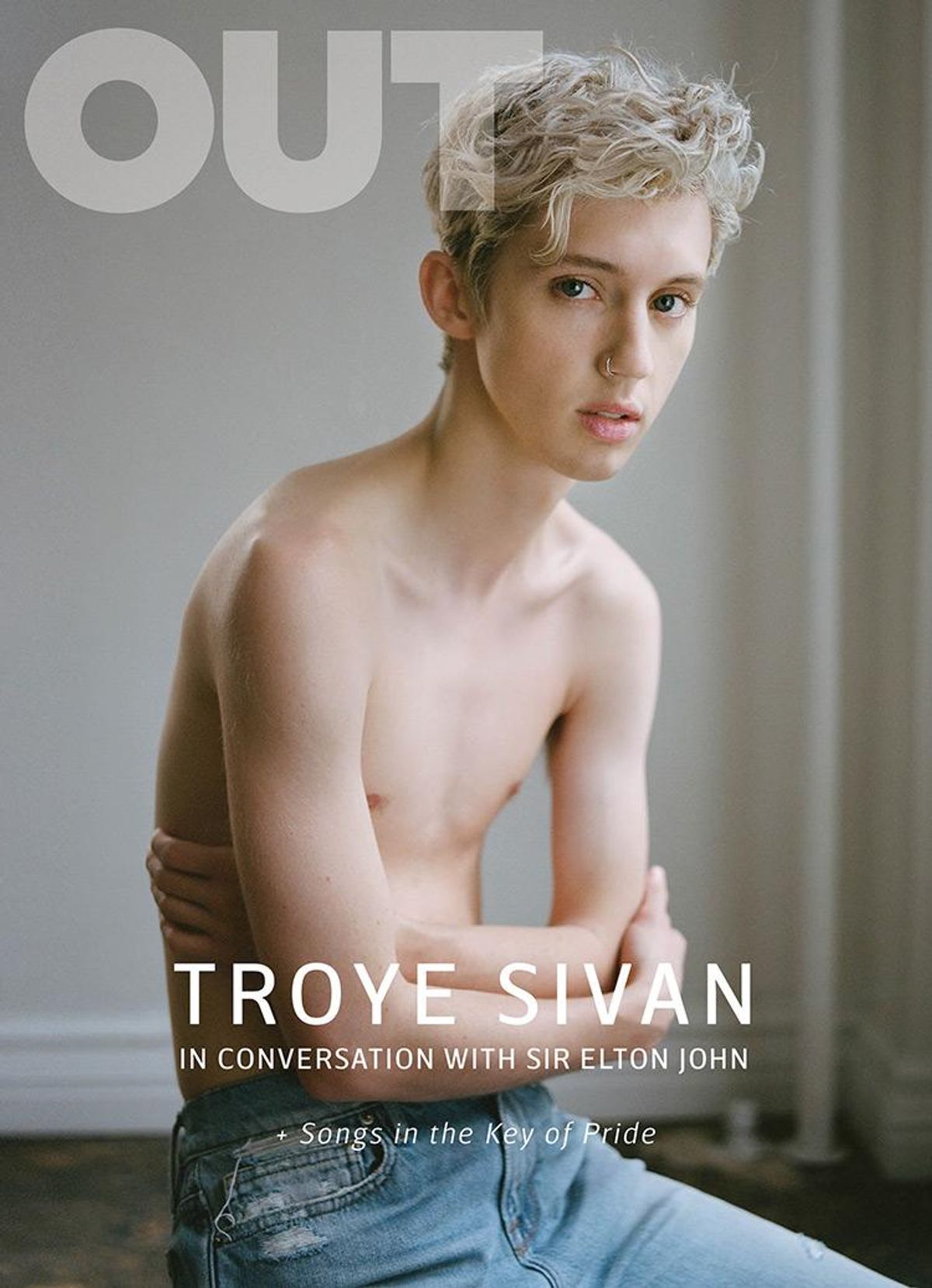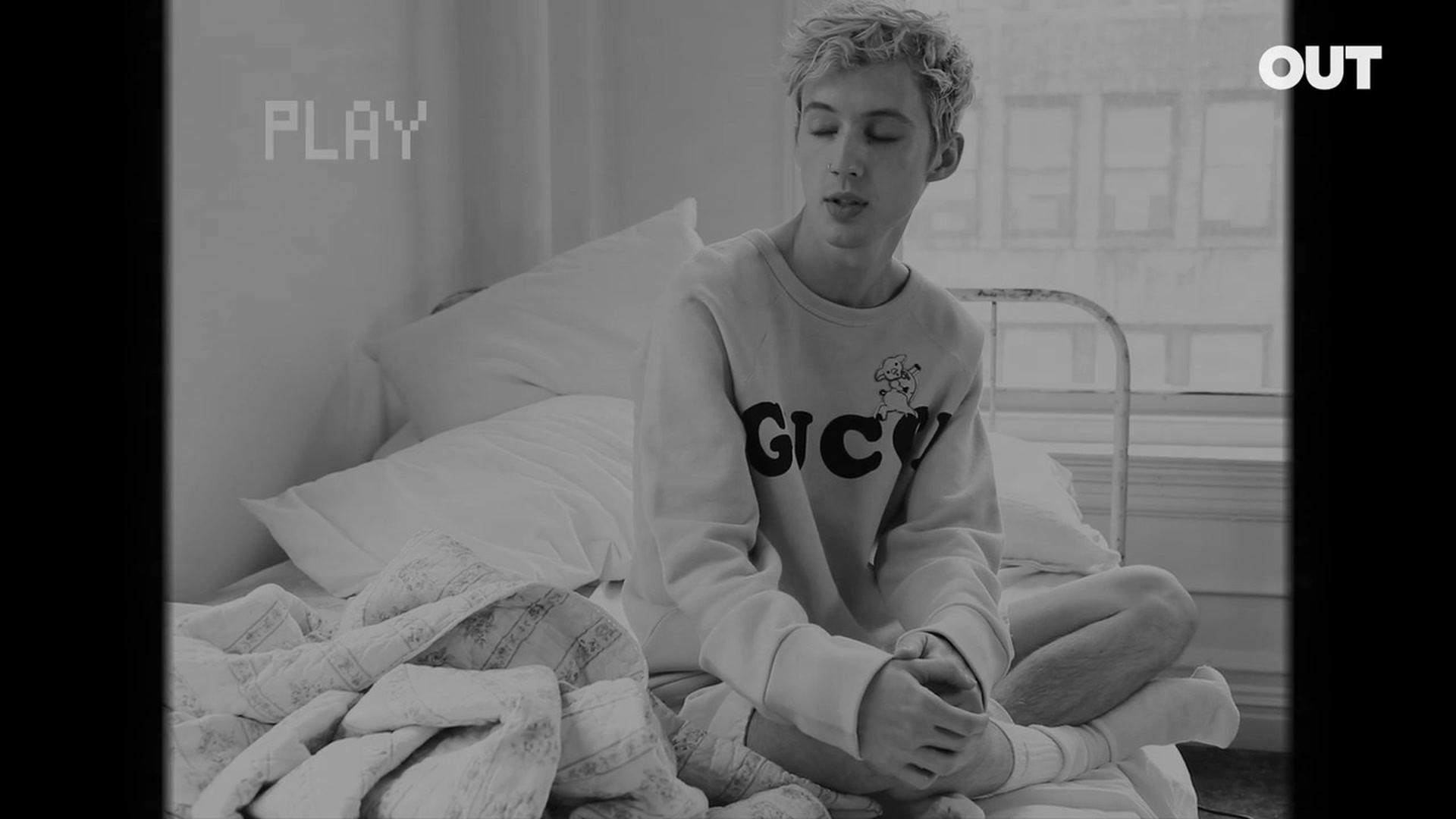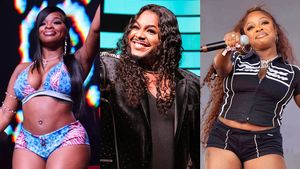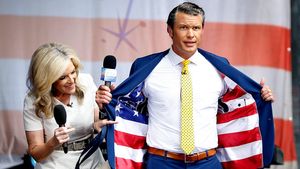Photography by Santiago & Mauricio. Styling by Grant Woolhead. Market Editor: Michael Cook. Groomer: Melissa Dezarate at The Wall Group using Sunday Riley Skincare and Kevin Murphy Haircare.
Troye Sivan is all grown up. The video for his recent single "My My My!," an infectious come-on with one of the most irresistible choruses of the year, will convince anyone who thinks otherwise. In it, a very wet Sivan -- decked out in a tight white tank top and an open shirt that flutters wildly behind him like a cape -- swivels his hips through dark hallways and shadowy bathroom stalls while several buff onlookers lurk in corners, lusting after him. But the sultry clip, released in January, was mere foreplay. Because make no mistake: Sivan's upcoming album, Bloom, is his sex album.
Related | Gallery: All of the Images From the Troye Sivan Cover Shoot
While the South African-born, Australian-raised, Los Angeles-based singer's 2015 debut, Blue Neighborhood, centered on the struggles of a young gay couple, Bloom is a pulsing, soaring celebration of queer love and its attendant desires -- "Take a trip into my garden / I've got so much to show you," coos Sivan on the less-than-subtle title track. Fans can also expect a sensual, shuffling duet with Ariana Grande, lyrics about boys becoming men, and a swoony morning-after ballad called "Animal." It all adds up to the kind of mature, polished, and accessible pop statement that could make him a chart-conquering star.

Sivan is 22, the same age his idol Elton John was in 1970 when his breakthrough single, "Your Song," became his first to crack the top 10. Sivan recently spoke with John -- who'll kick off his Farewell Yellow Brick Road tour in September -- about fashion, the creative process, and the evolution of the queer pop star.
Elton John: I just want to tell you that "My My My!" is one of my favorite singles of the year. I don't know why that wasn't a huge number one hit, because it's fabulous. I also watched your performance on Saturday Night Live, and it came across really well. Did you have a good time?
Troye Sivan: It was probably the single most overwhelming experience of my life. It was always my dream to play on that show, and every time I'd think about it, my hands would start sweating. I'd think, I don't know what I'm actually going to do if I ever book it. There were a couple of moments during rehearsal when I was thinking, What if I just fainted right now onstage? Would I get to go home?
EJ: You would have gotten a lot of headlines if you'd fainted. I died a couple of times, according to the press, and it's great for record sales. The odd faint here and there might be OK for your career. Just make sure you faint into the arms of someone beautiful.
TS: Once we were live, a switch flicked. In the past, nerves have been an issue for me, but with this I knew they were going to be there and I was ready for them. Right as Jessica Chastain said, "Ladies and gentlemen, Troye Sivan!," I felt all of the things I thought I'd feel -- my heart was racing, my hands were sweating, my knees were kind of weak. But I just remember smiling to myself and thinking, There it is.
EJ: That feeling is what you've worked toward. It was the same for me when I came to America in 1970 and played the Troubadour Club and saw all these famous people in the front row. I thought, Oh, my God, what the fuck am I going to do? And then you think, Well, I'm here, I've got to just go with it. Then, once it's over, you think, It wasn't so bad after all.
TS: Do you still get nervous about anything?
EJ: I get a bit nervous doing the first show of a tour, or with a new set list. I don't rehearse very much, and I hate sitting around backstage. I get so wound up -- I just want to go onstage. Once I'm on it, though, I'm all right. It's the waiting around that I hate. But you know, if you don't get a little nervous, you're not a performer. Fear is a good thing. There always has to be fear -- of making a new record, a new song, new appearances. That's the challenge. If you have no fear and you get used to it, it's called coasting. You don't want to do that.
TS: I was kind of hoping you'd say, "No, I never get nervous anymore," so that I'd have that to look forward to.
EJ: If I'm solo onstage, that's a bit more nerve-wracking, because if you play or sing a bad note, you're completely naked. But I don't get that nervous. Are you going on tour to promote your new record?
TS: Yeah, later this year.
EJ: What's the album called?
TS: It's called Bloom. Like a flower.
EJ: And how big is your band?
TS: There are four other people and me.
EJ: Are they all American?
TS: Yeah, they're all from L.A.
EJ: Are they young?
TS: Yeah.
EJ: Are they cute?
TS: They're very, very cute!
EJ: Oh, my God, I have to come see you!
TS: Please do!
Related | Troye Sivan Wore a See-Through Mesh Top to the Met Gala
EJ: I'm looking at a picture of you now, which is so beautiful. It was taken by Hedi Slimane, who's a friend of mine. When was it taken?
TS: Am I blond in it?
EJ: You're blond and wearing a striped shirt, and you look divine.
TS: That was a few months ago.
EJ: It's a fantastic photograph. Did you like working with him?
TS: Yeah, I love Hedi. He was actually one of the first people to latch onto me. I didn't have a manager when I came to L.A., so I met with a couple. This one said to me, "I would love to introduce you to Hedi Slimane." We went out for lunch, and he ended up shooting me for his diary the next day. I did some stuff for Saint Laurent -- I walked in one of their shows -- and we just remained really good friends. I didn't want to do anything crazy fancy -- I just wanted some classic portraitures to document where I am in my life and what I look like now.

EJ: Obviously, you love clothes, because you were picked to be the face of Valentino in their spring menswear campaign.
TS: Yeah, that was amazing. Fashion is something I was really scared of when I was a little kid because I didn't want anyone to think I was gay. I foolishly thought fashion was a very gay thing. I've obviously learned and grown a lot, but I feel like I only recently let myself really start to enjoy how I dress, and experiment with how I dress, and sign to brands that I love. It's still a new thing for me that I'm figuring out every day. I definitely didn't have the courage to dress how I wanted when I was younger.
EJ: Well, I grew up in the '50s, which is centuries ago, and my parents wouldn't let me wear anything fashionable -- winklepickers, Teddy Boy outfits, anything like that. So when I left home, I lived my teenage years during my twenties. I really went for it. I'm not Elton until I put on my stage outfit. That's when I transform into me. I've always loved clothes -- women's clothes, men's clothes, whatever. You always seem to dress brilliantly.
TS: Thank you. When you first started to experiment with how you dress, were you already performing?
EJ: No, I was writing songs with Bernie Taupin and living at my parents' apartment in North London. I started to wear the clothes I wanted to because I was with my mother and my stepfather, so things were a bit more lenient. Then I started to play live, and all hell broke loose. I had the best time of my life. Dressing in clothes that I love is still a big part of my life. Even at my age, which is getting up there, it's so much fun. How old are you now?
TS: I'm 22.
EJ: Ha! That was my age when I first made it in America, when I had "Your Song" on the charts. I first came to America in August of 1970. You're the age I was when I started to break out, so you're a bit ahead of me. When I started, I was living with my manager, who was gay, and I used to go to gay clubs in L.A. with him, but I was petrified of going because someone might recognize me. But nobody asked me in public if I was gay until 1976. I thought everybody knew. I was living with a very famous gay man in the London scene and thought, Well, it doesn't take much to put two and two together, but I'm also kind of blokey. I was into soccer and stuff like that, so people never asked me. But then I did an interview with Rolling Stone, and Cliff Jahr said, "I'm going to ask you a question." I said, "I know what it is. You're going to ask me if I'm gay." It wasn't like coming out for me -- I was already out. But the public didn't know. To be honest with you, it didn't really affect anything. You had the courage to come out at such an early age to your family, and they were very supportive, right?
TS: Yeah, I got really lucky. My family and friends were a textbook example for families and friends of people coming out. They showed unconditional love and support. I never wanted anyone to be able to tell me to stay in the closet for any reason, especially for work. I hadn't signed my record deal yet, and then I came out during the negotiations and expected them to be like, "Oh, you know, we're actually going to pass on this," but instead I woke up to a congratulations email from my label and ended up signing two weeks later. I felt like I got it out of the way, which I was happy about.
EJ: That's great. I've known a lot of artists who were terrified of coming out. When I told my mother and stepfather, they said, "We knew anyway." My mother's very perceptive. I was very lucky because I was supported. A lot of people aren't supported. They go through hell. You coming out at such an early age is wonderful. I think the younger generation, which you represent, has a different feeling about the whole thing. My children, who are 5 and 7, and your generation -- nobody seems to care much anymore. I'm very optimistic about the future. What you did, you did for yourself. You didn't do it to empower anybody else, but because you did it and because you're an entertainer, it got attention and it helped other people. People in little places will think, Oh, I'm so glad he did that because now I can try to be myself as well. So, well done.
TS: Thank you. Now the job is to make good music so that no one can put me in any sort of box. You're a good example of that, where maybe it was a big deal for a second, but then you put out such good music that people just lived with it and dealt with it.
Related | Troye Sivan's 'Bloom' Just Saved Gay Sex
EJ: I love being gay, and I wouldn't want it any other way, but being gay doesn't define me. It's part of who I am, but that's it. I've never thought I had to live a gay lifestyle because I'm gay. I have a lot of gay friends and I can be very lethal -- I have a sense of humor -- and I like to dress up. I can be camp when I want to be. But I love things that aren't particularly gay, like soccer. But there are also plenty of gay soccer players who can't afford to come out, or won't come out, because they're scared of what will happen. Then you have rugby players. You're from Australia, so you know about Australian Rugby League players and union players who have come out, and they've been completely supported, which is absolutely fantastic. How do you feel about the recent passing of gay marriage in Australia? It passed by a landslide.
TS: Yeah, I'm just relieved it's over. It was definitely a trying couple of months. We had the power and excitement around the "yes" movement, but the "no" movement also banded together and created a pretty loud voice for themselves, so I think we were all worried for a second because it had potential to really hurt a lot of people. But I'm just upset I wasn't there when it passed. I think it would have been a really fun night out in Sydney.

EJ: So tell me, do you have a boyfriend?
TS: I do, yeah.
EJ: How long have you been together?
TS: About two years.
EJ: That's great! I've been with David [Furnish] for 25 years now. Does having someone to come home to help you keep your feet on the ground? I find it incredibly comforting.
TS: Completely. For three or four years, I was just on the road. I hadn't gotten a place in L.A., and I was moving from Airbnb to Airbnb to my manager's house, and then I'd go back home to Australia to visit my family. I was on the go, and having that relationship gave me some stability and comfort in my life. Now that we've got a house, a place that's our own, I don't know how I lived without it.
EJ: When you've been traveling and working hard and then come home to something that's yours -- no matter how big or small it is -- when you walk through the door, it's so comforting. Let me ask you something naughty: When you are performing and there are cute boys in the audience, do you ever get tempted?
TS: I don't, actually. I've never been very adventurous in that way. I just take it easy. I think I'm just a relationship person. My parents have been married now for 28 years, and for me they are the example. I think they're more in love than ever.
EJ: I love that. Do you have brothers and sisters?
TS: I've got two brothers and a sister. I'm the second oldest. My brother is studying to be a lawyer, my sister is working at a PR agency and going to university, and my little brother is getting into music as well.
EJ: You're obviously a tight-knit family, which is amazing.
TS: I think having Australia and my family and friends to go back to really changes the game. All of this is amazing, but as far as I'm concerned, it feels like an absolute fantasy world and a dream that I dip into. I'm playing these shows in all these crazy places, and I'm in L.A. meeting all these amazing people, and then as soon as I start to feel overwhelmed or lonely, I go back to Australia and it's exactly how I left it.

EJ: You act, as well. You're in a new LGBTQ movie coming out this fall called Boy Erased.
TS: Yeah, it's based on a memoir by this guy who was sent to a conversion therapy camp for gay kids. It explores how dangerous those camps can be. Unfortunately, it still happens all over the world. I think the movie made me more empathetic to parents who send their kids to those camps.
Some people think coming out is a death sentence, or worse -- some religious people think it's a sentence to hell. I think these parents panicked, and because of a lack of education, they didn't know where to turn. They were taken advantage of. It left a lot of people very damaged. I'm hoping this movie will be a catalyst, a way to educate parents on the right way to handle their kids coming out.
EJ: Did you see Call Me by Your Name?
TS: Yep, I love that movie.
EJ: And God's Own Country? Did you see that?
TS: No, I haven't seen that.
EJ: It's a British film about a gay man who works on a family farm up in the north of England. Both those films were so great. I also think the new Queer Eye is fantastic. It's much more empathetic and intelligent -- they delve deep into the psyche of people. I think with all this and with the film you're going to be in, it's an exciting time to be LGBTQ.
TS: I wanted to ask you: How did your philanthropy and the Elton John AIDS Foundation come about? I'd definitely like to do something like that in the future. I find it really inspiring.
EJ: I was very much into drugs and alcohol for 16 years. HIV and AIDS had just surfaced, and for some reason I didn't become HIV-positive. During that time, I met Ryan White, who would become this amazing poster boy. He was a young man who got HIV through a blood transfusion. When it happened, because of the ignorance and stigma around AIDS at that time, his family had people firebombing their house and firing bullets through their windows. I read about it in Newsweek at a doctor's office and was so incensed. I got a hold of the family and became involved with them, and I was there for the last week of Ryan's life.
That was in 1989 and 1990. I just thought, This family is so brilliant. They've been treated so badly, but they're not bitter. They don't blame anyone. I'd go back to my hotel room and complain about the wallpaper and the fucking room service, and I just felt like I'd lost my way as a person. Six months after he died, I got sober and clean. I still am -- it's 28 years this July.
I wasn't at the forefront of ACT UP or anything like that, and I thought, I must do something to give back, and I'm going to do it properly. So my boyfriend at the time, John Scott, and I sat down at a table in Atlanta and started the Foundation. We started by delivering meals to people who, at that time, had been given a death sentence. There were no antiretroviral drugs, and people were dying at a frightening rate.
I was determined that it would be a small foundation that didn't waste any money. There was a man called Patrick Lippert who was dying of AIDS and used to have an Oscar party for political purposes. He said, "Will you do one for HIV?" So we did and raised $350,000. We thought we were the kings of the world. We've had one ever since. To get your hands dirty, you have to do it properly, so I visited the projects we founded. I'm doing a world tour that's going to last for three years, and when I finish that I want to go visit more of our projects. When you see the joy it brings to people, it makes you even more determined. We've raised more than $400 million. I honestly think we can end this disease.
This foundation has changed my life, and it's all because of Ryan White and his family. They taught me a lesson; they showed me what a self-involved asshole I was.
TS: I write almost all my music with my best friend, Leland. We've written together for a few years now, and he's on, I think, eight of the 10 songs on my new album. I often think about us in the same context as you and Bernie Taupin. How did you two start making music together?
EJ: I answered an advert in the New Music Express that said, "Songwriters and singers wanted." I was playing in a crappy band and thought, Anything's better than this. So I applied. I was very chubby and shy, and I had written a couple of songs for my band and had recorded and sung them, but I couldn't write lyrics. So I went into the office and said, "I can't write lyrics, but I know I can write songs." There were so many envelopes on the desk, and they gave me one. I took it home, and it was Bernie's. So I started writing songs to his lyrics. The odds of that happening -- that I had the courage to answer the advertisement, and they gave me, of all people, that one envelope? It was so weird. We've been together now for 50 years, and we've written songs in the same way nearly every time. We're never in the same room. I write to lyrics. I don't come alive until I see the lyrics. He gives it to me, he goes away, I write it, then I play it for him. It hasn't really changed from the word "go," and it's probably why I haven't written a lot of gay songs: I don't write the lyrics. When you and your songwriting partner write, do you have a melody in your head and then play the melody?
TS: It's more like when one person gets stuck, the other will jump in and just throw around words and melodies. We do the whole thing together.
EJ: I love teamwork. It means a lot to me that Bernie and I are still together after 50 years. We still love each other as much as we did when we started. This business can be very cruel and very hard on relationships, so always treasure that relationship. Hold on to it if you can.
TS: I definitely will. That is the goal now for me and my writing partner: 50 years.




























































































